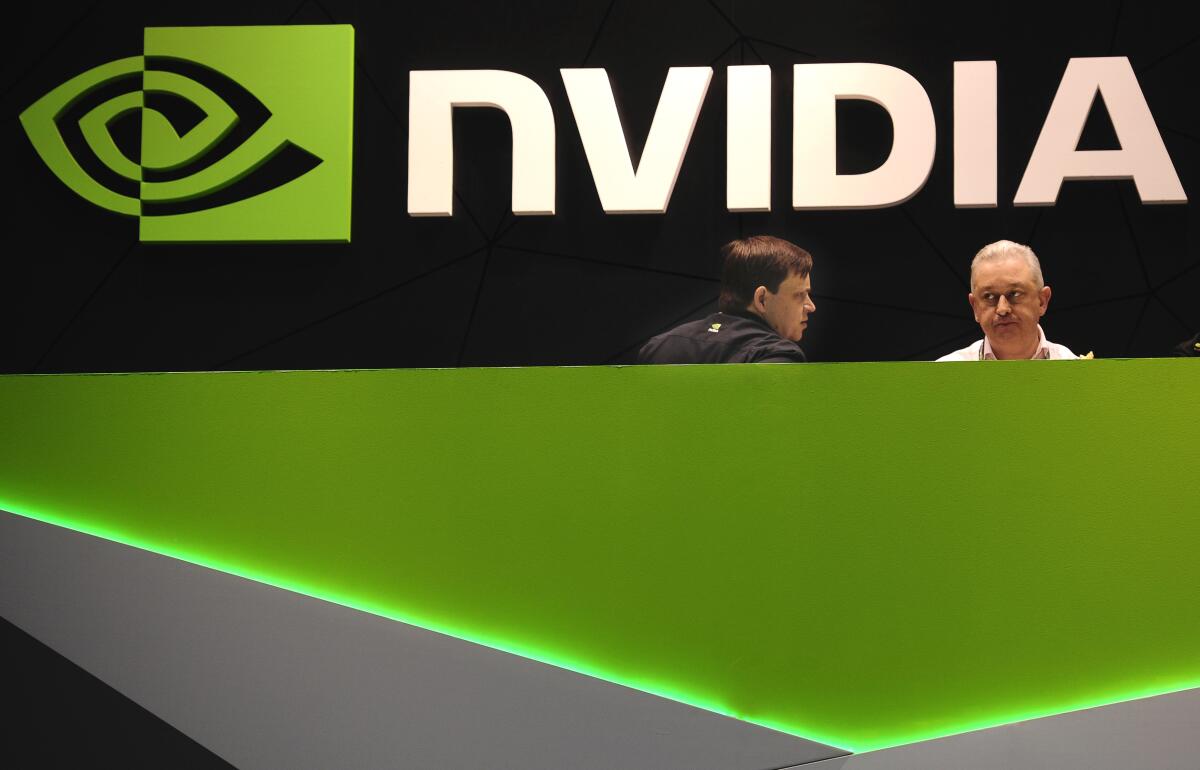Nvidia gives upbeat forecast as AI reaches ‘tipping point’

- Share via
Nvidia Corp. predicted another massive sales gain for the current quarter, helping justify a stock rally that has turned it into one of the world’s most valuable companies.
Revenue in the current period will be about $24 billion, the company said in a statement Wednesday. Analysts had predicted $21.9 billion, on average. Results in the fourth quarter also sailed past Wall Street estimates.
Nvidia Chief Executive Jensen Huang said generative AI has reached a “tipping point.” The shares jumped 9% in extended trading after the announcement.
They earlier closed at $674.72 in New York, leaving them up 36% for the year.
The outlook extends a streak of Nvidia shattering expectations, thanks to insatiable demand for its artificial intelligence accelerators — highly prized chips that crunch data for AI models. The technology has helped power a proliferation of chatbots and other generative AI services, which can create text and graphics based on simple prompts.
“Accelerated computing and generative AI have hit the tipping point,” Huang said in the statement. “Demand is surging worldwide across companies, industries and nations.”
Nvidia’s market capitalization increased by more than $400 billion this year — bringing its valuation to $1.67 trillion — as investors bet that the company will remain the prime beneficiary of an AI computing boom.
Nvidia, co-founded by Huang in 1993, got its start as a provider of graphics cards for computer gamers. Its profile blew up in the last two years, when its technology proved adept at handling heavy AI workloads. The company’s H100 accelerators have become legendary in the tech world, with customers scrambling to get their hands on as many as possible.
Companies such as Amazon.com Inc., Meta Platforms Inc., Microsoft Corp. and Alphabet Inc.’s Google are Nvidia’s largest customers, accounting for nearly 40% of its revenue, as they rush to invest in hardware for AI computing.
In the fiscal fourth quarter, which ended Jan. 28, Nvidia’s revenue more than tripled to $22.1 billion. Profit was $5.16 a share, minus certain items. Analysts had predicted sales of about $20.4 billion and earnings of $4.60 a share. Underscoring the magnitude of its recent growth streak: As recently as 2021, it didn’t generate that much revenue in an entire year.
Nvidia’s data center division, now by far its largest source of sales, generated $18.4 billion of revenue, up 409% from the same period a year earlier. Gaming chips provided $2.87 billion in sales.
Nvidia is now working to spread its AI technology beyond the big data-center companies.
Huang, 61, has traveled the globe, saying that governments and corporations need their own AI systems — both to protect their data and to gain a competitive advantage.
Nvidia announced a deal with Cisco Systems Inc. this month that gives it a new distribution channel. As part of that deal, Cisco, the world’s biggest provider of networking gear, will help sell complete AI systems to companies.
But Nvidia faces risks, including mounting competition and a push by some customers to develop their own AI chips.
Advanced Micro Devices Inc. recently began selling a line of accelerators called the MI300. It expects revenue of $3.5 billion from that product this year, up from an earlier projection of $2 billion. But Nvidia isn’t standing still. Analysts expect the company to soon unveil more powerful accelerators.
Nvidia also has had to navigate new export rules for chips headed to China, the largest market for semiconductors. The company has scaled down the capabilities of its products in order to continue to sell to that region, which in the past has accounted for a quarter of its revenue. Three months ago, Chief Financial Officer Colette Kress told analysts that the company’s projections would have been higher if it weren’t for the China rules.
More to Read
Inside the business of entertainment
The Wide Shot brings you news, analysis and insights on everything from streaming wars to production — and what it all means for the future.
You may occasionally receive promotional content from the Los Angeles Times.










